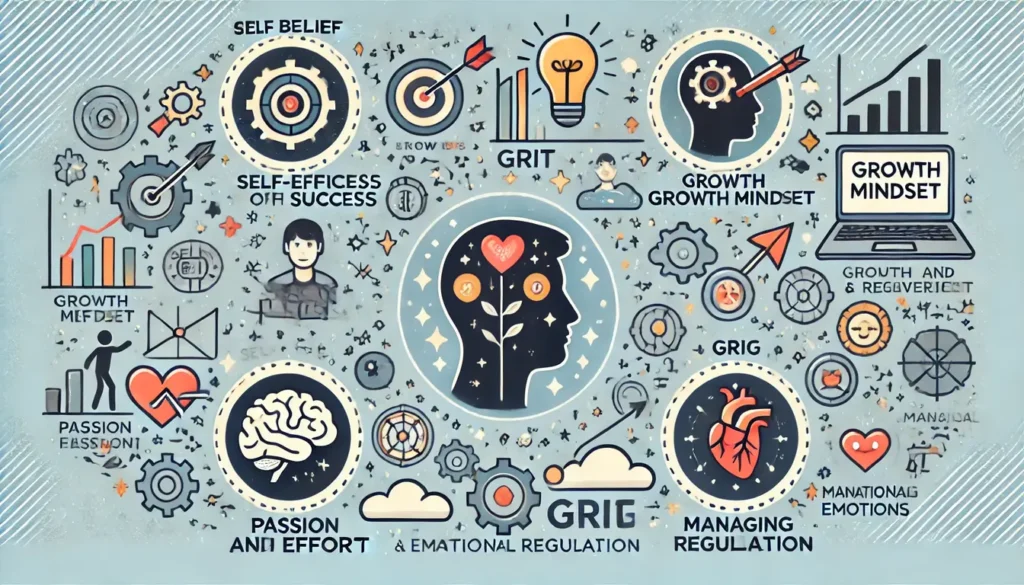In a world of constant change and uncertainty, there’s a quality that stands out among those who achieve greatness and overcome challenges: being unwavering. Unwavering: how this power word can make you better encapsulates a mindset and approach to life that can transform your personal and professional journey. But what does it mean to be unwavering, and how can embodying this concept elevate your life?
Imagine a captain steering a ship through a storm. Despite the roaring waves and howling winds, the captain maintains a steady hand and a firm resolve, navigating the ship to safety. This is the essence of being unwavering: persisting in the face of both triumphs and setbacks, maintaining a steady course toward your goals
“Success is not final, failure is not fatal: it is the courage to continue that counts.” – Winston Churchil
This quote perfectly captures the essence of being unwavering. It’s about persisting through both triumphs and setbacks, maintaining a steady course toward your goals.
In this blog post, we’ll explore the depths of what it means to be unwavering and how cultivating this quality can lead to personal growth, improved relationships, and professional success.

1. Understanding the Concept of ‘Unwavering’
At its core, being unwavering means staying firm in your convictions, purpose, or direction, regardless of the challenges or distractions that may arise. It’s about maintaining consistency in your actions and thoughts, even when faced with adversity or the temptation to stray from your path.
Key aspects of being unwavering include:
- Steadfastness: Remaining firm in your beliefs and commitments.
- Resilience: Bouncing back from setbacks without losing focus.
- Consistency: Maintaining a steady approach over time.
- Determination: Pursuing your goals with a relentless spirit.
“It’s not that I’m so smart; it’s just that I stay with problems longer.” Albert Einstein
Einstein’s words highlight a crucial aspect of being unwavering: persistence. It’s not about innate talent or intelligence but rather the willingness to stick with something even when it’s difficult.

2. The Psychology Behind Unwavering Behavior
Understanding the psychological underpinnings of unwavering behavior can help us cultivate this quality more effectively. Several psychological concepts come into play:
- Self-efficacy: The belief in one’s ability to succeed in specific situations or accomplish a task.
- Growth mindset: The belief that abilities and intelligence can be developed through effort, learning, and persistence.
- Grit: The combination of passion and perseverance for long-term goals.
- Emotional regulation: The ability to manage and respond to emotional experiences.
Research in positive psychology suggests that individuals who exhibit unwavering qualities tend to have higher levels of self-efficacy and grit. They also typically possess a growth mindset, which allows them to view challenges as opportunities for learning and improvement rather than insurmountable obstacles.
“The greatest glory in living lies not in never falling, but in rising every time we fall.” – Nelson Mandela
Mandela’s quote encapsulates the resilience aspect of being unwavering. It’s not about never facing setbacks, but about how we respond to them.

3. Cultivating an Unwavering Mindset
Developing an unwavering mindset is a process that requires conscious effort and practice. Here are some strategies to help cultivate this powerful quality:
a) Clarify Your Values and Purpose
Start by identifying what truly matters to you. What are your core values? What’s your life purpose? Having clarity on these fundamental aspects provides a solid foundation for unwavering behavior.
b) Set Clear Goals
Establish clear, specific, and meaningful goals that align with your values and purpose. These goals will serve as your North Star, guiding your actions and decisions.
c) Develop a Growth Mindset
Embrace challenges as opportunities for growth. View failures as learning experiences rather than personal shortcomings.
d) Practice Mindfulness
Mindfulness can help you stay present and focused, improving your ability to remain unwavering in the face of distractions or setbacks.
e) Build Resilience
Work on developing your emotional and mental resilience. This can involve techniques like reframing negative situations, practicing self-compassion, and developing problem-solving skills.
“The oak fought the wind and was broken, the willow bent when it must and survived.” Robert Jordan
This quote reminds us that being unwavering doesn’t mean being rigid. It’s about maintaining your course while having the flexibility to adapt to circumstances.
4. The Impact of Being Unwavering in Personal Life
Adopting an unwavering approach can significantly enhance various aspects of your personal life:
a) Relationships
Being unwavering in your commitments and values can foster trust and respect in your relationships. It demonstrates reliability and integrity to those around you.
b) Personal Growth
An unwavering commitment to self-improvement can lead to continuous personal growth and the achievement of long-term goals.
c) Emotional Well-being
The resilience associated with being unwavering can contribute to better emotional well-being and stress management.
d) Decision Making
A clear sense of purpose and values makes decision-making easier and more consistent, reducing stress and cognitive load.
“The greatest glory in living lies not in never falling, but in rising every time we fall.” – Nelson Mandela
This quote, worth repeating, underscores the importance of resilience in personal growth and emotional well-being.
5. The Power of Being Unwavering in Professional Success
In the professional realm, being unwavering can be a game-changer:
a) Leadership
Unwavering leaders inspire confidence and trust in their teams. They provide a stable presence in times of uncertainty and change.
b) Career Advancement
Consistently working towards your professional goals, even in the face of setbacks, can lead to significant career advancement over time.
c) Entrepreneurship
For entrepreneurs, being unwavering is often the difference between success and failure. It helps persist through the inevitable challenges of building a business.
d) Workplace Reputation
Colleagues and superiors come to rely on and respect those who demonstrate unwavering commitment and consistency in their work.
“Success is not final, failure is not fatal: it is the courage to continue that counts.” – Winston Churchill
Churchill’s words are particularly relevant in the professional context, where setbacks and failures are common, but persistence is key to long-term success.

6. Overcoming Challenges to Unwavering Behavior
While the benefits of being unwavering are clear, maintaining this approach isn’t always easy. Here are some common challenges and how to overcome them:
a) Fear and Self-doubt
Challenge: Fear of failure or self-doubt can shake your resolve.
Solution: Practice self-compassion and remind yourself of past successes. Focus on the process rather than just the outcome.
b) External Pressures
Challenge: Social pressure or conflicting demands can pull you off course.
Solution: Stay connected to your core values and purpose. Learn to say no to things that don’t align with your goals.
c) Burnout
Challenge: Constant effort without proper self-care can lead to burnout.
Solution: Incorporate regular breaks and self-care practices. Remember that being unwavering is about long-term consistency, not short-term intensity.
d) Lack of Immediate Results
Challenge: Not seeing quick results can be discouraging.
Solution: Focus on small wins and progress. Celebrate milestones along the way to your larger goals.
“Our greatest weakness lies in giving up. The most certain way to succeed is always to try just one more time.” Thomas Edison
Edison’s quote reminds us that persistence is key, especially when facing challenges or setbacks.

7. Balancing Unwavering with Flexibility
While being unwavering is powerful, it’s crucial to balance it with flexibility:
a) Adaptability
Being unwavering doesn’t mean being inflexible. It’s about maintaining your core direction while adapting your approach as needed.
b) Open-mindedness
Stay open to new information and perspectives. Being unwavering in your goals doesn’t mean being closed off to better ways of achieving them.
c) Learning and Growth
Use your unwavering nature to commit to continuous learning and personal growth. This can sometimes mean changing course if you discover a better path.
d) Compassion
Balance your unwavering approach with compassion for yourself and others. Recognize that everyone faces challenges and setbacks.
“Stay committed to your decisions, but stay flexible in your approach.” Tony Robbins
Robbins’ quote perfectly encapsulates the balance between being unwavering and flexible.
8. Real-life Examples of Unwavering Individuals
Looking at real-life examples can provide inspiration and insights into the power of being unwavering:
Malala Yousafzai
Despite facing life-threatening opposition, Malala has remained unwavering in her advocacy for education and women’s rights. Her journey began in Pakistan’s Swat Valley, where she defied the Taliban’s ban on girls’ education. Even after surviving a brutal attack, she continued her fight, becoming a global symbol of resistance and empowerment. Malala’s unwavering commitment has led to international recognition and a Nobel Peace Prize.
Elon Musk
Musk’s unwavering commitment to his vision of sustainable energy and space exploration has led to groundbreaking innovations despite numerous setbacks. From the early days of SpaceX, when repeated failures almost bankrupted the company, to Tesla’s near-collapse during the production of the Model 3, Musk’s resilience and determination have driven success. His unwavering belief in his goals has revolutionized multiple industries, from automotive to space travel.
J.K. Rowling
Rowling faced multiple rejections before Harry Potter was published, but her unwavering belief in her story led to one of the most successful book series in history. Living on welfare and struggling as a single mother, Rowling persisted through countless rejections from publishers. Her dedication and unwavering belief in her work eventually paid off, transforming her into one of the world’s most beloved authors and a literary icon.
Martin Luther King, Jr.
King’s unwavering commitment to civil rights and non-violent protest in the face of enormous opposition changed the course of history. Despite threats, imprisonment, and even violence, King maintained his steadfast approach to achieving equality through peaceful means. His leadership during the Civil Rights Movement and his iconic “I Have a Dream” speech remain powerful testaments to the impact of unwavering determination.
“The ultimate measure of a man is not where he stands in moments of comfort and convenience, but where he stands at times of challenge and controversy.” Martin Luther King, Jr.
This quote from King himself underscores the importance of remaining unwavering in the face of adversity.
9. Practical Tips for Building Unwavering Determination
Visualization
Visualize your success regularly. Seeing yourself achieve your goals can reinforce your determination and keep you motivated.
Set Milestones
Break down your goals into smaller, achievable milestones. Celebrate each success along the way to keep your spirits high.
Develop a Support System
Surround yourself with people who support your goals and values. A strong support system can provide encouragement and advice when you need it most.
Stay Flexible
Being unwavering doesn’t mean being inflexible. Be open to new ideas and approaches that might help you achieve your goals more effectively.
Regular Reflection
Take time to reflect on your progress. Regularly assessing where you are and what you need to adjust can help you stay on track.
Conclusion:
Being unwavering is more than just a personality trait; it’s a powerful approach to life that can lead to personal growth, stronger relationships, and professional success. By cultivating an unwavering mindset, we equip ourselves with the fearlessness and determination needed to overcome challenges and achieve our goals.
Remember, being unwavering doesn’t mean being inflexible or stubborn. It’s about maintaining a steady course toward your values and goals while having the wisdom to adapt your approach when necessary. It’s about rising after every fall, learning from every setback, and persistently moving forward.
Steps to Start Being Unwavering Today:
- Identify Your Core Values: Determine what truly matters to you.
- Set Clear Goals: Align your goals with your values and make them specific and meaningful.
- Develop a Growth Mindset: Embrace challenges as opportunities for growth.
- Practice Mindfulness: Stay present and focused in the face of distractions.
- Build Resilience: Work on your emotional and mental strength.
As you incorporate this power word into your life, you’ll likely be better equipped to handle life’s ups and downs, more focused on your long-term goals, and more consistent in your personal and professional endeavors. The path to becoming unwavering may not always be easy, but the rewards—in terms of personal fulfillment, relationship quality, and professional achievement—are well worth the effort.
“It always seems impossible until it’s done.” Nelson Mandela
Let Mandela’s words be a final reminder that even the seemingly impossible can be achieved with an unwavering spirit. Start today: identify your core values, set clear goals, and commit to being unwavering in your pursuit of a better you and a better world.
FAQ’s
What is the difference between being unwavering and being stubborn?
Being unwavering involves a steadfast commitment to your goals and values, often with a positive and flexible mindset. Stubbornness, on the other hand, can imply a refusal to adapt or consider new perspectives, even when it’s beneficial.
How can I stay motivated when facing setbacks?
Focus on your end goals, celebrate small wins, and maintain a positive mindset. Surrounding yourself with supportive people and reminding yourself of your purpose can also help sustain motivation.
Can being unwavering ever be detrimental?
Being unwavering can become detrimental if it turns into inflexibility or stubbornness. It’s important to remain open to new ideas and adaptable to changing circumstances while staying committed to your core goals and values.
How long does it take to develop an unwavering mindset?
Developing an unwavering mindset is a continuous process that varies for each individual. It involves consistent effort, self-discipline, and a positive outlook. The key is to start with small steps and gradually build your determination over time.
What are some daily practices to cultivate unwavering determination?
Daily practices such as setting clear goals, visualizing success, practicing self-discipline, and reflecting on your progress can help cultivate unwavering determination. Additionally, maintaining a positive mindset and seeking support from others are crucial steps.
By implementing these strategies and understanding the profound impact of unwavering determination, you can significantly enhance your personal and professional life, achieving a sense of fulfillment and success.






